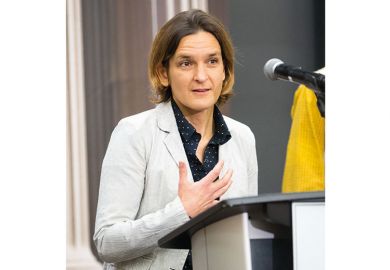Two Nobel prizewinners are helping to create a master’s degree programme to which students – even those without an undergraduate qualification – gain admission solely by their online course performance.
The Massachusetts Institute of Technology is trying the idea in the field of poverty alleviation, hoping that the approach will allow it to enrol students from around the world who have the ability and motivation to succeed but lack the traditional credentials for entry.
However, eyebrows have been raised by the course’s tuition fees, which stand at nearly $27,000 (£20,600).
The degree programme’s creators include Esther Duflo and Abhijit Banerjee, the married MIT economics professors who won the most recent Nobel Prize in Economic Sciences (along with Michael Kremer of Harvard University), for bringing experimental techniques to the study of poverty.
According to its director, Maya Duru, the master’s programme reflects the laureates’ desire to enrol more motivated people from around the world and help them develop an understanding and skills that they can employ in poverty alleviation efforts in their home countries.
Achieving that required finding a new pathway for those students to get into MIT, Dr Duru said. “We believe that the current system of admissions isn’t really working.”
The new degree, a master’s in data, economics and development policy, was orchestrated by Professor Duflo and Professor Banerjee within the Abdul Latif Jameel Poverty Action Lab, which the pair helped to establish at MIT in 2003.
Applicants must successfully complete five online prerequisite courses to be eligible for consideration to come to MIT for the semester-long classroom instruction, said Dr Duru, the poverty lab’s associate director of education. The inaugural class will begin next month with 22 students, mostly from developing countries, including Brazil, India, Jordan, Lithuania, Mexico, Nigeria, Peru, South Africa and Zimbabwe.
One outspoken critic of the Duflo-Banerjee approach to fighting poverty, Aparna Gopalan, said she was encouraged to see innovative efforts to help the poor from within a graduate school setting.
But Ms Gopalan, a doctoral student and teaching fellow in anthropology at Harvard University, acknowledged overall scepticism given her belief that the Duflo-Banerjee methods involve “treating the lives of the poorest as a giant open-air lab” while avoiding meaningful challenges to the wealthy.
She also noted that the course’s tuition fees and its requirement for an internship in a city where the annual cost of rent is about $30,000 seemed to present difficult hurdles for students from low-income backgrounds.
While conceding the economic challenges facing the students, Dr Duru said that MIT had been working with donors – including some of the other participating students – to help defray costs. Yet despite that, she added, some of the accepted students could not afford the costs and had to defer.
Dr Duru also acknowledged that the Duflo-Banerjee approach does involve tests on people, such as experiments comparing strategies for increasing immunisation rates.
The hope, Dr Duru said, is that graduates of the MIT programme will learn to conduct their own such experiments and then disseminate findings among the leaders of their home countries’ relevant sectors.
For easing poverty, she said, it means identifying “concrete steps that you can actually take towards getting there”.
Register to continue
Why register?
- Registration is free and only takes a moment
- Once registered, you can read 3 articles a month
- Sign up for our newsletter
Subscribe
Or subscribe for unlimited access to:
- Unlimited access to news, views, insights & reviews
- Digital editions
- Digital access to THE’s university and college rankings analysis
Already registered or a current subscriber?








